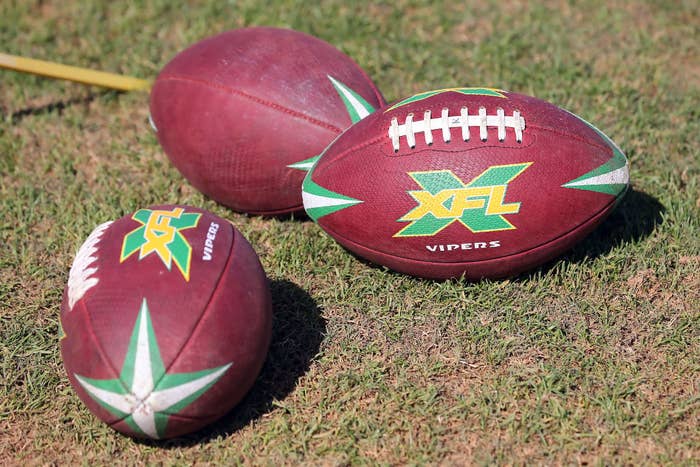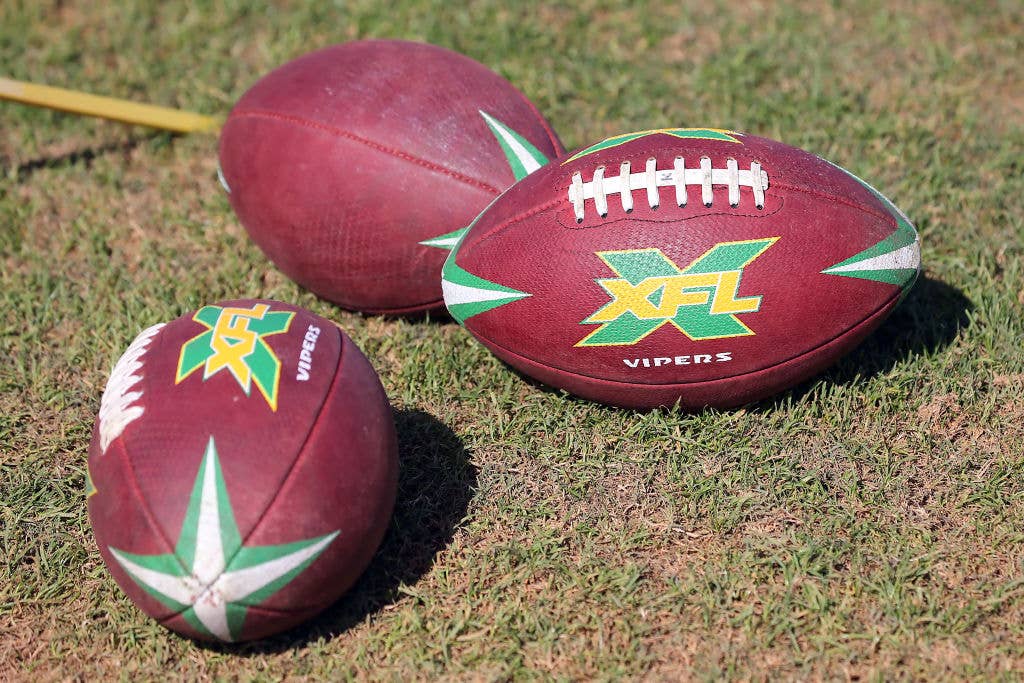
The most entertaining football league on the planet lasted only one season, kicking off and shutting down in 2001. But after a nearly two-decade hiatus—and years of fans saying that it was simply too beautiful for this world—the XFL is back. Its second iteration will kicks off Saturday.
So, if you're sad about the NFL being over and desparetely need a football fix, the XFL is here to try and fill the void. Will they succeed this time around? They certainly seem to be more setup for success than in 2001, but as we've seen with other football leagues that aren't the NFL, it's not easy at all. Still, fans are excited about the XFL and they've done a solid job to bring in some notable talent that viewers will at least recognize when they turn on their TVs.
Though it’s still called the XFL, things will be different this time. We’re here to review everything you need to know as the league gets started.
The Teams
There are eight teams in the XFL (same as in XFL version 1.0), all playing in NFL (or recent NFL) markets: the Dallas Renegades, DC Defenders, Houston Roughnecks, LA Wildcats, NY Guardians, St. Louis Battlehawks, Seattle Dragons, and Tampa Bay Vipers.
The schedule will span 10 weeks and 40 games, running from this weekend until Sunday, April 12. Four teams in total will make the playoffs, the top two in both the East and West. Those semifinal matchups will take place April 18-19, with the title game Sunday, April 26.
Different Rules
Kickoffs
Get this: the kicker will line up at his own 30 (so, don’t expect many touchbacks), but his coverage team will be at the opposition’s 35...with the receiving team’s blockers lined up only 5 yards away, at their own 30.
No one besides the kicker can move until the returner touches the pigskin. As Blandino explains in the below video, the goal is to create more big plays on kickoffs. Given the elimination of a running start for the coverage team, it should also minimize brutal collisions. In punt coverage, players also can’t move until the ball is kicked.
1, 2, 3-Point Conversions
Sports-for-entertainment junkies rejoice: there are no PAT kicks. The scoring team will have the option of going for 1, 2 or 3. To go for 1, they have to get in from the 2-yard line. A 2-pointer will require scoring from the 5, and a 3-pointer from the 10. The defense can score 1, 2 or 3 (depending on the type of attempt) by returning a turnover for a score.
Double Forward Passes
That’s right—but with a caveat. Both passes have to occur behind the line of scrimmage. So, a QB could throw a screen to an RB or WR, who could also throw a forward pass if he stays behind the line. We see highlights in the future!
Shootout-Style Overtime
Much like NHL shoot-outs or soccer penalty kicks, the XFL’s OT will go five rounds—with each team having a chance to score 2 points from 5 yards out (in one play) in each round. If they’re tied after the five rounds, sudden death will ensue.
TV Details
The league gets rolling at 2 p.m. ET Saturday with Dragons-Defenders at Audi Field (home of DC United, though the XFL will also play in NFL, MLB, and NCAA venues), with the first game airing on ABC. The ABC/ESPN suite and FOX family will air all games (ABC, ESPN, ESPN2, FOX, FS1, or FS2). Announcers will include well-known names like Steve Levy, Curt Menefee, and Pat McAfee. The typical schedule will be two games on Saturday, two games on Sunday.
If you’re interested in catching a game, the cheapest tickets cost about $20.
Players and Coaches You'll Recognize
Landry Jones
The longtime Steelers backup QB was publicized as the first well-known XFL signee. He’ll play for the Renegades.
A fourth-round pick in 2013, Jones played sparingly behind Ben Roethlisberger. His most notable performance came in the final game of the 2016 season. With playoff-bound Pittsburgh (they’d go on to lose in the AFC Championship Game against New England) resting Roethlisberger, Jones went 24-for-37 for 277 yards, three touchdowns, and one pick in leading Pittsburgh to a 27-24 win over the rival Browns. The Steelers released him after drafting Mason Rudolph in 2018.
Jones suffered a knee injury at practice in early January. It’s not yet clear whether he’ll be ready for the opener, but he is expected to be on the field soon.
Cardale Jones
Former Ohio State QB Cardale Jones, who led the Buckeyes to the 2014 national title after injuries to Braxton Miller and J.T. Barrett, will suit up for the Defenders.
Jones, a fourth-round pick in 2016, bounced around the NFL for three years, making his last stop on the Seahawks’ practice squad for two brief weeks in 2019. Jones has only attempted 11 passes in his NFL career, but he’s a big name because of his memorable NCAA title run...and that classic tweet about how he didn’t go to OSU to “play school.” (He has since changed his tune.)
Other Big-Name Players
Players will typically make about $50,000, but some big-name players could earn up to half a mil.
Former Michigan State QB Connor Cook will lead the Houston Roughnecks. Cook, a fourth-round pick from Michigan State, had a cup of tea with four NFL teams from 2016-19, most recently on the Lions’ practice squad.
Former Panthers running back Cameron Artis-Payne will play for the Dallas Renegades. Artis-Payne, 28, played four years with the Panthers, accruing 491 yards and five touchdowns.
Former North Carolina back Elijah Hood is one of the younger players in the league, at 23 years old. He was one of six UNC players drafted in 2017, but didn’t last long in the league after quick stints with the Raiders, Panthers and Jaguars. He’ll run the rock for the Wildcats. Hood is one of the XFL players young enough to have legitimate hope of building a career in the NFL if he performs well.
A similar approach will be taken by former West Virginia safety Kenny Robinson. He was dismissed from school due to an academic issue and, instead of transferring to another college, chose to go the XFL route. He is eligible for the upcoming NFL draft.
Former Ravens safety and special-teams ace Will Hill, who also played in the CFL and AAF, will suit up for the St. Louis Battlehawks. The Ravens released Hill, who won a title in college with Urban Meyer and Florida, in March 2016 after a failed drug test.
Former Navy standout quarterback Keenan Reynolds, who played in the NFL as a receiver from 2016-19 with the Ravens, Redskins and Seahawks, will catch passes for the Seattle Dragons. Reynolds was a third-team All-American in 2015. He is one of the XFL’s athletes who more recently played in the NFL, having only been waived by the Seahawks right before the start of the 2019-20 season. (The XFL estimates roughly half its players have been signed in the NFL in the past six months.) Given Reynolds’ ability to throw the ball and the XFL’s unusual rules, he could be an intriguing, Taysom Hill-like weapon for the Dragons.
Longtime NFL backup QB Josh Johnson, going on 34 years old, is the league’s savvy vet. Johnson, who played for 12 NFL teams in an 11-year NFL career, will play with Hood on the Wildcats.
Other names you might recognize: Marquette King, Christine Michael, Aaron Murray, Jace Amaro, Matt McGloin, Sammie Coates, Taylor Heinicke, Donnell Pumphrey, KD Cannon, and Tyree Jackson.
Coaches
Some of the biggest names in the league will be on the sideline wearing visors and khakis. Former Bears coach Marc Trestman leads the Vipers, while former Redskins coach Jim Zorn leads the Dragons.
Oklahoma legend Bob Stoops is heading up the Renegades. Longtime college and NFL coach June Jones is charged with steering Houston. And former Giants offensive coordinator Kevin Gilbride is again leading a team in New York, this time the Guardians.
New XFL Leadership
Vince McMahon, the WWE patriarch, was one of the visionaries behind the original XFL, partnering with NBC executive Dick Ebersol. McMahon has for years mentioned wanting to reboot the concept, and his Alpha Entertainment is behind XFL 2.0. McMahon’s hefty bank roll (estimated net worth over $2 billion) could differentiate this league from previous failed entities like the Alliance of American Football.
He’s designed this version of the league to be less entertainment-oriented, less like a no-holds-barred WWE match. In essence, McMahon is looking to temper the controversy and make everything more buttoned-up. Instead of eyeball-grabbing debauchery, he’s emphasizing innovation (see: rules changes below). The XFL is shooting for essentially a faster-paced version of the NFL as it aims to become an engaging (yet serious) spring option for football fans. The XFL wants its games to last roughly half an hour less than NFL games.
McMahon isn’t the only name in a leadership position that you’ll recognize. The accomplished Oliver Luck—former president of NFL Europe, former West Virginia athletic director, former president/GM of the MLS’ Houston Dynamo, and father of recently retired Colts QB Andrew Luck—is the CEO and commissioner. He’s here to infuse the league with professionalism.
Additionally, Dean Blandino—former NFL VP of Officiating and current FOX analyst—is the head of officiating. The league’s president and COO is Jeffrey Pollack, who was formerly CMO for the San Diego Chargers and commissioner of the World Series of Poker.





